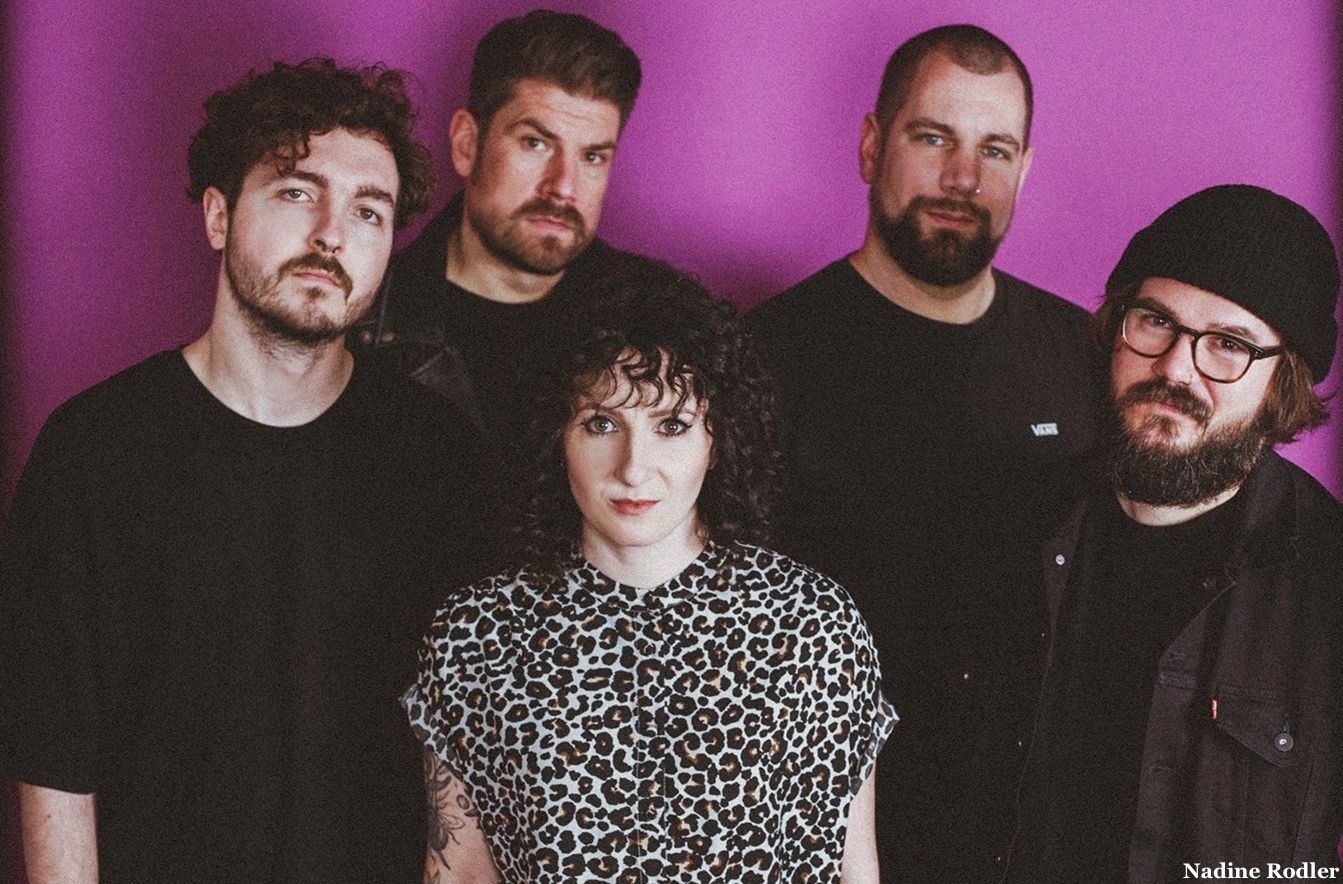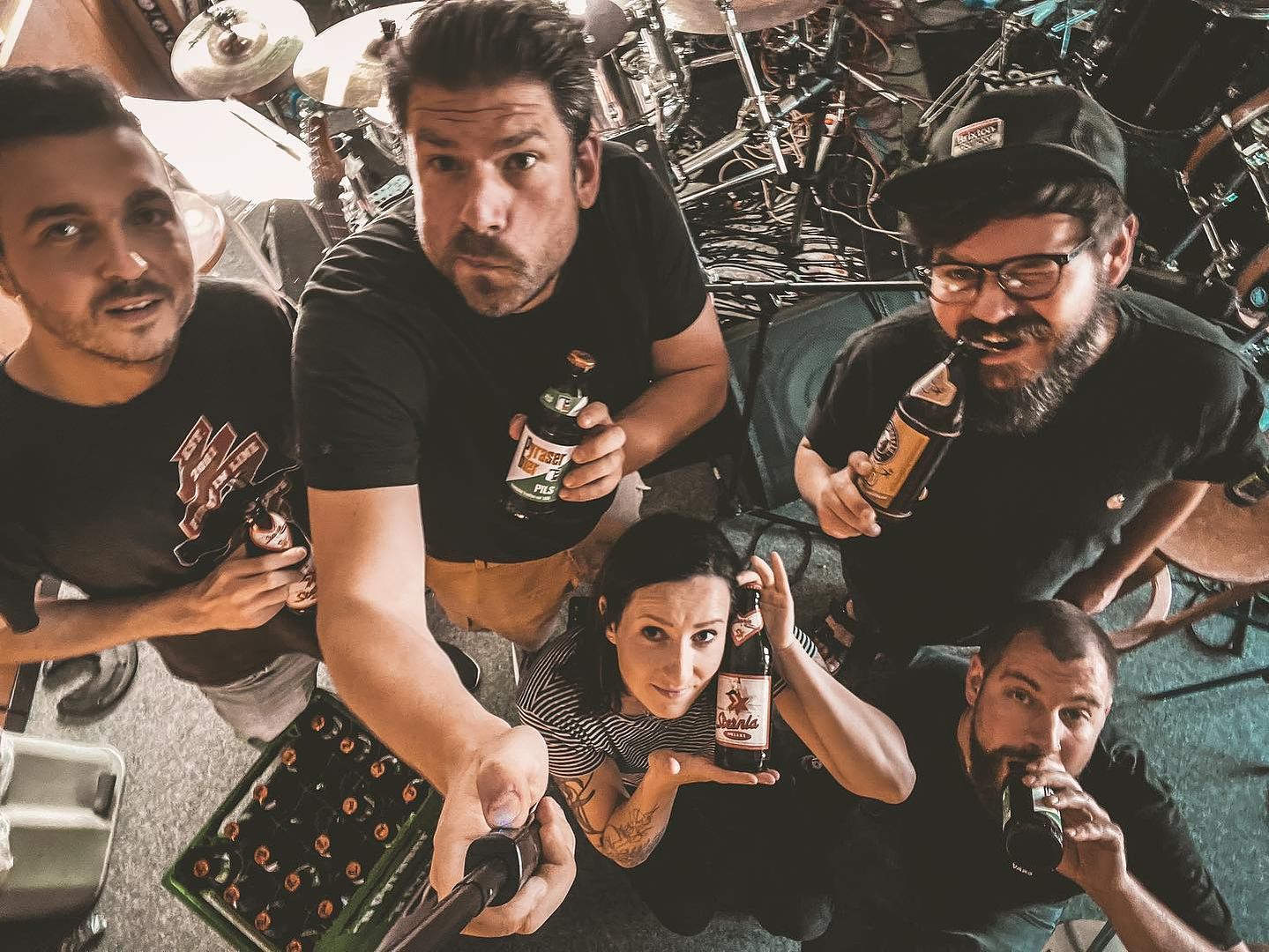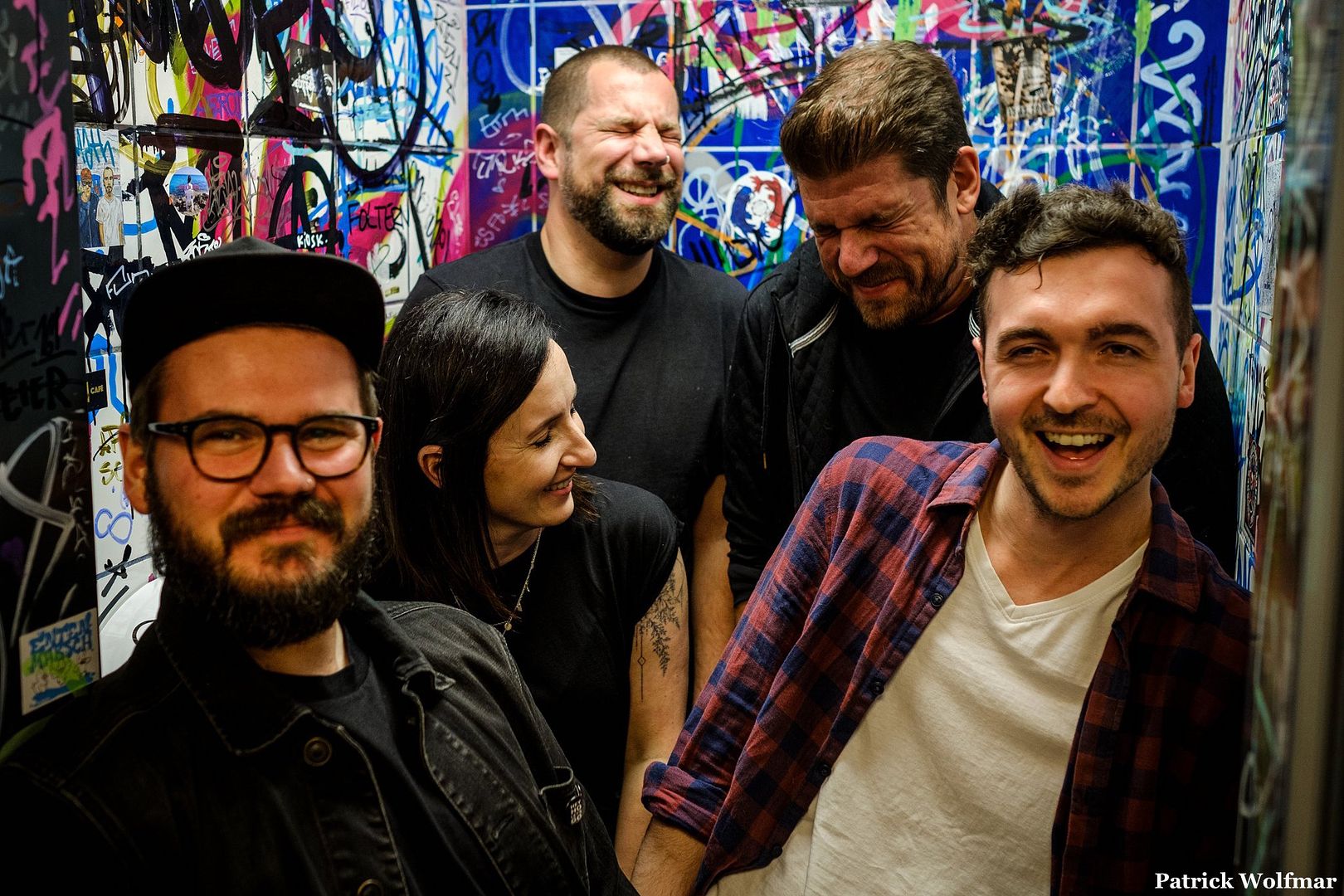8 Things You Should Know About Melonball

Nuremberg-based punk rock artists Oli, and Basti (photo: center, and far right) have been playing in bands since they were teenagers, but when they were about to have their first show as Melonball there was a special vibe they had never felt before.
The show was outdoors, taking place when everyone was just coming out of the pandemic, and Basti says, “I remember that right before the show I was peeking around the corner where people could come in, into the area, and the cue didn’t end. I was like WOW, I’m getting nervous, give me a beer.”
Everything went off without a hitch, and over a year after coming together as a band Melonball’s journey had officially begun.
Consisting of Oli (vocals), Basti (guitar/ backing vocals), Mally (guitar), Jens (bass), and Julian (drums/backing vocals), Melonball released their debut album, Breathe, last week via Thousand Island Records / Lockjaw Records, and the fast-paced skate punk songs are tailor made for rowdy crowds ready to have a good time.
With Breathe fresh in everyone’s ears, here are eight things you should know about Melonball.
They come from a unique, dual-language German punk rock scene
The punk rock scene in Germany features two distinct types of bands. There are the bands that sing in German, which Oli describes as “a very special kind of punk, with German lyrics, and a very specific political point of view.” Then there are the bands that sing in English, like Melonball, which fall under the heading of skate punk, or American melodic punk.
Interestingly, the German, and English speaking bands not only co-exist, they perform together, oftentimes on the same bill.
Their second show was an unexpectedly early realization of a dream
In an unfortunate bit of timing, when Melonball were ready to hit the stage, the entire world shut down. Basti remembers, “When we could say ‘Now we want to play shows,’ BAM, the pandemic hit.”
The band, however, struck gold when pandemic restrictions were lifted, and live music came back, booking a gig at what they consider to be a pinnacle of rock festivals – Punk Rock Holiday.
Held annually in Slovenia, coming out of the pandemic Punk Rock Holiday held a smaller Punk Rock Camp event, and Melonball were on the bill. Calling the experience, “Really amazing,” Basti says, “I always said when I form a punk rock band one goal in the far future is to play Punk Rock Holiday, and we got this as our second show.”

The band’s debut album, Breathe, tackles everything from the personal, to the political
Moving at a blistering pace, Melonball’s ten-track debut album has a myriad of layers to it, just like the act of breathing.
“Breathing is like the one thing you need to do if you want to live,” Oli explains, “but also it can give you relaxation, it can give you anxiety, it can give you a bad, or a good feeling, so it kind of combines everything into one. That’s what we’re trying to do with some of the songs on Breathe.”
When it comes to the topics the band tackles on Breathe, she says, “For us it was taking really specific themes, like emotional health, or political things, or things that are going to shit in this world, and to break them down into the one thing that can be one emotion, and this breaking down is also breathing, because breathing is also life, if you break it down.”
Politically, the issues they address are worldly, rather than local, but for Basti, the two are always intertwined. “My personal opinion is when you go through the world with open eyes you will see that almost exactly the same problems are in every corner around the world. You have discrimination against certain people, you have power spread unevenly throughout society, you have all those issues, they’re all the same in the whole world, so you can’t address local problems without knowing what is around you, I’d say.”
Oli adds, “Even the very personal problems, for example in the song ‘Rage’ I talk about mental health, which also is a very global problem.”
For Melonball, singing about these things is a way of showing people no one is alone in their battle.
Basti explains, “When you’re dealing with mental health problems the thing is you always think you’re alone, but then when you start talking to other people you realize that you’re not alone, because other people are dealing with those mental health problems, as well. So when you open up yourself to other people talking about that particular problem you could quickly realize that it’s better to share than to keep it inward for yourself. That’s also a major realization, at least I made, and the music helps because we are quite fortunate to travel around, and play music in front of so many people, which means we are getting to know so many people, and yeah, they all have issues, problems, not only mental health problems, but problems from their region, and when you start to talk about those problems I think it helps to connect, to know what’s going on in other corners of the world.”
They want everyone to know female-fronted is not a genre
Melonball has a “female-fronted is not a genre” campaign, and it stems from Oli’s experiences in bands, most notably the comments she’s far too used to hearing from everyone from concert goers, to concert bookers.
She says the main reason the notion of “female-fronted” is problematic to her is because, “I don’t want to be seen as somebody else inside of this genre, and we as a band do punk rock, we don’t do female-fronted punk rock, or female-fronted anything.”
She continued, adding, “I can tell you that like every second show some guy would come over to me, and would say, ‘Oh, normally I don’t like female voices, but your band is very great.’ I know they feel like that sounds like a compliment, but I always feel like, OK, how do we separate now – do we have good singers, bad singers, and female singers?”
Flipping the idea, she notes, “You never hear, ‘Oh, normally I don’t like male drummers, but this particular one I enjoy.’ You would never hear that, so why is it with female voices? Females can shout, they can sing, they can growl, they can sound very harsh, or very soft, just like male voices can.”
In regards to bookers, she says things are starting to change for the better, noting when she was younger the typical response was, “Thanks for applying, but we already have a band with a female voice.” She does add, however, that there’s now a difficult line for bookers to carefully toe where they need to point out there are women, and non-binary people on a bill, but not in such a way as to make it seem like those bands were booked purely for PR purposes.
The band’s name is steeped in personal history
The famed Punk Rock Holiday festival is know for great music, but there’s also an alcoholic beverage that’s become synonymous with the event. That drink is the melon ball, which consists of Midori, vodka, orange juice, and, of course, melon balls.
With Oli and Basti having met at a Punk Rock Holiday festival, and the duo having connected with the other original members of the band there (they’ve had two member changes since then), the entire quintet wanted to pay tribute to this aspect of their history.
They considered a bunch of potential names, ultimately landing on Melonball, even though, Oli jokes, it was “the one that nobody was actually quite happy with.”
“Everybody was like, hmmm … yeah, OK.”

They love a good ‘80s song
Nearly every member of Melonball was born in the ‘80s (only Mally was born later). Wanting a cover from the decade in their repertoire, they started going through some of their favorite songs, but Basti notes they quickly found that not everything could be turned into a punk rock song. “‘Sleeping in My Car’ from Roxette didn’t work,” he says with a bit of a laugh.
“Your Love” by The Outfield, however, turned out to be a perfect fit.
Melonball’s version of “Your Love” is the final song on Breathe, and is also one of the final songs they perform in their set.
If you’re in a band you might end up their best friend
Melonball have experienced a serious amount of camaraderie in their country’s punk rock scene. According to Oli, “Even in this short time, wherever we go, and whenever we meet another band, we would completely be friends, and then help each other out, and book each other for other shows, or let each other sleep at your place, or anything.”
Basti describes the familial vibe, as, “We drank a beer, and now you’re invited to my birthday party.”
All the members of Melonball are still kinda floored by everything that’s going on
For Basti, and the rest of the band, the ride they’re on is one they aren’t taking for granted.
“It’s amazing for me to even be on the road, to play shows, to have the opportunity to play with A Wilhelm Scream, a Belvedere, or The Toasters. This is always amazing, and for us as a band, since we’re around only two or three years, it’s still something I’m always blown away by. People are showing up to our shows, they’re enjoying the music, afterwards they come to the merch, and buy t-shirts, or tell us how much they enjoyed the show. This is actually what amazes me most, and it’s nice.”
Oli adds, “I think the weirdest feeling ever for me was when the first (person) asked me to sign something. That was like – do you really want me to ruin whatever you have there with me signing it? Are you sure?”
The person was sure, and Melonball have signed quite a few autographs since then.
For more Melonball, check out linktr.ee/melonball.

Comments